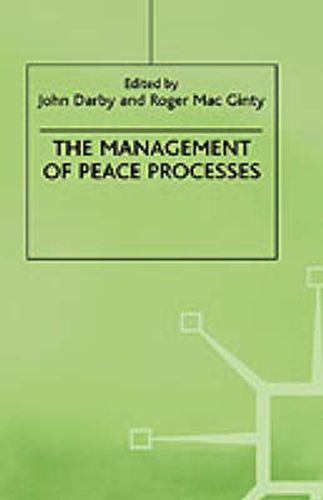Readings Newsletter
Become a Readings Member to make your shopping experience even easier.
Sign in or sign up for free!
You’re not far away from qualifying for FREE standard shipping within Australia
You’ve qualified for FREE standard shipping within Australia
The cart is loading…






This title is printed to order. This book may have been self-published. If so, we cannot guarantee the quality of the content. In the main most books will have gone through the editing process however some may not. We therefore suggest that you be aware of this before ordering this book. If in doubt check either the author or publisher’s details as we are unable to accept any returns unless they are faulty. Please contact us if you have any questions.
In recent years, the resolution of violent conflicts has undergone significant changes. The UN-dominated interventions of the late 1980s have been replaced by a new form of peace process. This typically involves the protagonists more directly in the process, with external interventions from regional and neighbouring countries rather than the UN, in attempts to move protracted ethnic conflicts towards some sort of political accommodation. Yet there are few comparative analyses of how these peace processes are managed and how they tackle obstacles such as violence during negotiations or re-integrating former combatants into civil society. The Management of Peace Processes has monitored five peace processes (Israel/Palestine, South Africa, the Basque Country, Sri Lanka and Northern Ireland) over more than two years. Based on interviews with senior politicians and policy-makers involved in all five peace processes, it identifies those factors which facilitate or block political movement in deeply divided societies. It highlights issues of negotiation and constitutional change, political violence, economics, external influences, public opinion and symbolism. The book also challenges a number of commonly accepted views associated with peace processes such as the existence of peace dividends, the role of leaders and the impact of violence on negotiations.
$9.00 standard shipping within Australia
FREE standard shipping within Australia for orders over $100.00
Express & International shipping calculated at checkout
This title is printed to order. This book may have been self-published. If so, we cannot guarantee the quality of the content. In the main most books will have gone through the editing process however some may not. We therefore suggest that you be aware of this before ordering this book. If in doubt check either the author or publisher’s details as we are unable to accept any returns unless they are faulty. Please contact us if you have any questions.
In recent years, the resolution of violent conflicts has undergone significant changes. The UN-dominated interventions of the late 1980s have been replaced by a new form of peace process. This typically involves the protagonists more directly in the process, with external interventions from regional and neighbouring countries rather than the UN, in attempts to move protracted ethnic conflicts towards some sort of political accommodation. Yet there are few comparative analyses of how these peace processes are managed and how they tackle obstacles such as violence during negotiations or re-integrating former combatants into civil society. The Management of Peace Processes has monitored five peace processes (Israel/Palestine, South Africa, the Basque Country, Sri Lanka and Northern Ireland) over more than two years. Based on interviews with senior politicians and policy-makers involved in all five peace processes, it identifies those factors which facilitate or block political movement in deeply divided societies. It highlights issues of negotiation and constitutional change, political violence, economics, external influences, public opinion and symbolism. The book also challenges a number of commonly accepted views associated with peace processes such as the existence of peace dividends, the role of leaders and the impact of violence on negotiations.